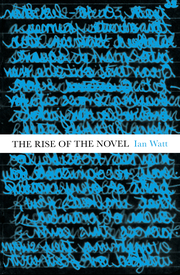Detailansicht
The Rise Of The Novel
eBook - Studies in Defoe, Richardson and Fielding
ISBN/EAN: 9781473524439
Umbreit-Nr.: 9210621
Sprache:
Englisch
Umfang: 320 S., 1.56 MB
Format in cm:
Einband:
Keine Angabe
Erschienen am 29.10.2015
Auflage: 1/2015
E-Book
Format: EPUB
DRM: Adobe DRM
- Zusatztext
- <p><b>This is the story of a most ingenious invention: the novel. Desribed for the first time in<i>The Rise of The Novel</i>, Ian Watt's landmark classic reveals the origins and explains the success of the most popular literary form of all time.</b></p><p>In the space of a single generation, three eighteenth-century writers -- Daniel Defoe, Samuel Richardson and Henry Fielding -- invented an entirely new genre of writing: the novel. With penetrating and original readings of their works, as well as those of Jane Austen, who further developed and popularised it, he explains why these authors wrote in the way that they did, and how the complex changes in society the emergence of the middle-class and the new social position of women gave rise to its success. Heralded as a revelation when it first appeared,<i>The Rise of The Novel</i>remains one of the most widely read and enjoyable books of literary criticism ever written, capturing precisely and satisfyingly what it is about the form that so enthrals us.</p>
- Kurztext
- This is the story of a most ingenious invention: the novel. Desribed for the first time in The Rise of The Novel, Ian Watt's landmark classic reveals the origins and explains the success of the most popular literary form of all time.In the space of a single generation, three eighteenth-century writers -- Daniel Defoe, Samuel Richardson and Henry Fielding -- invented an entirely new genre of writing: the novel. With penetrating and original readings of their works, as well as those of Jane Austen, who further developed and popularised it, he explains why these authors wrote in the way that they did, and how the complex changes in society the emergence of the middle-class and the new social position of women gave rise to its success. Heralded as a revelation when it first appeared, The Rise of The Novel remains one of the most widely read and enjoyable books of literary criticism ever written, capturing precisely and satisfyingly what it is about the form that so enthrals us.
- Autorenportrait
- Ian Watt (1917-99) was a Professor of Humanities at Stanford University. During the Second World War he worked as a prisoner on the construction of the notorious Burma Railway before turning to the study of English literature.<i>The Rise of the Novel</i>(1957) was the first of a dozen books he wrote and is widely regarded as the seminal work in the study of the novel. His other books include<i>Conrad in the Nineteenth Century</i>(1979),<i>Conrad: Nostromo</i>(1988) and<i>Myths of Individualism: Faust, Don Quixote, Don Juan and Robinson Crusoe</i>(1998).
